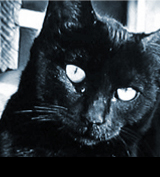|
Tommy Shannon hardly needs an introduction.
Some of the highlights in his lengthy career include playing bass for legendary Texas blues guitarist Johnny Winter in the
1960s. Another is being a member of Double Trouble, the rhythm section for yet another legendary Texas guitarist, Stevie Ray
Vaughan - who shook the blues world and revitalized the blues genre in the 1980s. Shannon was, and still is, in the business
of making blues music and Crossroads Blues is pleased to present the following interview with a legendary blues artist in
his own right, and all-around nice guy, Tommy Shannon.
CB: Tommy, you were with Johnny Winter at a time when he was just in the early stages of becoming
the artist that we all know today. What did you learn about the blues from being around Johnny Winter?
TS: Oh, I leaned a lot.
Before I got with Johnny Winter, Uncle John (the drummer) and I lived up in Dallas, and we'd hear like a Cream record and
see the name Robert Johnson on the bottom and we'd think it must be some friend of theirs. So we didn't know anything about
the blues. But when we got with Johnny, I'll never forget one night he sat me down and it took hours to do this but he played
all the way back to field hollerers, all the way through up to the present. And I came out with a real understanding of what
the blues was and after that I had no problem playing.
CB: He gave you a history lesson for sure.
TS: Right, he is my teacher.
CB: With Johnny, you were first doing covers, and then the decision was made to focus more on writing
original material. In your view, how significant was that change in direction?
TS: It was very significant.
When I first got with the band we were doing songs like (sings) “by the time I get to Phoenix” (laughs), and “Holiday”,
we were doing some Hendrix copy songs, “Shadow of Your Smile”, whatever we needed to play to make money you know.
It was actually Uncle John's idea, the drummer, and he kind of pushed to Johnny, he said we can be a blues band, we're as
good as anybody out there. And Johnny said yeah, but we won't make any money, but he kindly agreed and so we became a blues
band, and sure enough we didn't make any money until things hit for us but it was really Uncle John who's the brain behind
the whole thing.
CB: How do you feel about writing original material and its role for blues artists to establish
themselves? For young guys starting off?
TS: It's kind of a paradox.
In a way it's necessary. You got to realize when you go back and look at people like Muddy Waters and his band, Little Walter,
all those guys, B.B. King, and they are real blues. There's nothing better than that. There's nothing gonna get any better
than that. So, in a way, when you write a blues song you are kind of defeating yourself because it's never going to be as
good as the original. I'm talking about the old guys. Most of them are gone now, but when you listen to what they've done,
they are absolutely perfect…the songs, their playing. And like I said, at the same time, it's necessary to have you
own songs too.
CB: Among the many highlights of being the bassist in Winter's band was playing Woodstock, and the
band didn't, and perhaps no one did grasp the real significance of Woodstock at the time. How do you feel about playing Woodstock
in retrospect?
TS: Like you said, we didn't
realize until after the fact. I remember we went in with these little bubble helicopters, and from the sky, I could not believe
the people there. I mean, I can't even put it into words how big the crowd was. So, I knew something special was happening,
and we played and all that but we didn't know until after that, that half a million people were there. It was a great experience.
 "This was with Johnny Winter, in 1969 in upstate New York.
Uncle John Turner on the left, Johnny in the middle, and me
on the far right.
This was the greatest year in Rock & Roll."
CB: Of course, after playing with Johnny Winter, you hooked with Stevie (Ray Vaughan). Stevie deservingly
received much attention for his guitar playing, and it's sometimes easy to forget how great the songs were. To name a few,
“Pride and Joy”, “Crossfire”, and “Couldn't Stand The Weather” are catchy, have great
hooks, and are instantly recognizable. How did the band approach arranging these songs?
TS: Actually, Crossfire
and Couldn't Stand The Weather, I had something to do with myself. Crossfire especially, I pretty much wrote the music.
CB: Congrats on that, because when you hear it, it's one of those songs that takes all of 3 seconds
to know that it's Crossfire. It has that hook and character.
TS: It's kind of like whatever
ideas we came up with, we'd get together and get a band idea of what we wanted to do and just pursue that.
CB: Would songs get worked out in the studio or during soundchecks?
TS: Usually on a gig (laughs).
CB: And eventually it would take form?
TS: We'd talk about it before
we got up there. Usually it took place on a gig. We did rehearse some, but so much took place while were playing.
CB: What about, getting a little more specific, in “Couldn't Stand The Weather” was
there a conscious decision to change up the timing of the breaks early in the song?
TS: That's was Jimmie Vaughan's idea. And it was a cool little hook we threw in there. We thought
it would be cool to leave a 2 beat space in there.
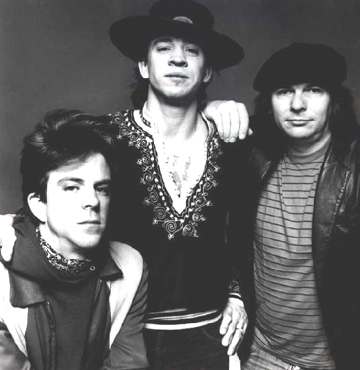 "One of the earliest Double Trouble promotional photos - around 1981. (Just guessing).
Seems like a long time ago."
CB: Stevie's influence on guitar players was, and is, enormous, and many guitarists attempt to mimic
his playing, his sound, his look and even his moves. On your website you respond to letters that contain "I am (or my friend/family
member is) the next Stevie Ray Vaughan...". As you point out, “there isn't going to be another Stevie”. What advice would you give
to guitarists/musicians to move beyond mimicking Stevie (or anyone), and to using Stevie's music as a catalyst to develop
their own approach and sound?
TS: Well, we all have out
influences. Like I was talking about Muddy Waters all the way through B.B. King, Albert King, Albert Collins, all the way
through, we have people we draw on, and we learn to play from them. Stevie is one of those guys too. But the main thing, it's
kind of like a big melting pot. You throw all those people in there and you stir it up and you pull your own style out. And
it's kind of like you don't get hung up on just one person. You try to find your own unique sound. And it's kinda strange,
I'm going out next month with Kenny Wayne Shepherd, and he's been criticized a lot for copying Stevie, and he's trying to
get out of that right now, which I think is a very good thing.
CB: Correct me if I'm wrong, but I would presume that Stevie would want people to find their own
sound, yet still show your influences…
TS: Yeah, Stevie was the
kind of guy, if someone wanted to play like him or something like that, he would say, go back and listen to the guys I listened
to. They're the ones I got what I have from. He would always try point back toward to the old guys, the original guys.
CB: You mentioned how Johnny Winter took you though the history of the blues, and how you'd see
a song listed as Robert Johnson and presume it was a friend of the band. And like Johnny Winter had shown you where those
songs came from, for sure the music of Stevie Ray Vaughan and Double Trouble has done that for a lot of people, and that's
an accomplishment in and of itself.
TS: Yeah, he also helped
a lot of the old blues guys who were still alive. It kind of gave them a shot in the arm because everybody started looking
back at them.
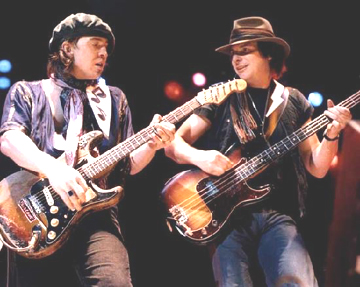 "Stevie and I. Great days back then. We were on fire.
Taken at Will Rogers Auditorium in Ft. Worth, Texas
in September of 1984 - right before the Carnegie Hall show."
photo: Jeff Jones
CB: Stevie was, as you are, very respectful to the original blues guys, and unfortunately there
aren’t many of them still alive.
TS: I know. The golden era
is almost over. It's really like white people have inherited the blues. There's some real good ones out there now. I think
in a matter of time, the white people are going to get a lot better at it. It's kind of a birth of a new music through white
people. I think it's gonna get better because, if you look at it, it's the white people who have inherited it.
CB: On a different topic, you've had some hard times with drug addiction, and it has resulted in
dark periods in your life. Any advice for musicians to avoid the pitfalls of drug abuse?
TS: The advice that I could
give would probably take hours, but to sum it up, it's hard to tell somebody to not get mixed up with drugs and alcohol; they're
going to do it anyway. So what they need to realize is that it's either going to kill their career or it's going to hurt it
a lot. Had I not got strung out on drugs for so long, I think I could have gone a lot further in my own music career. It destroys
the devotion you have for it. The most important thing is to really love it, to love it enough to make any kind of sacrifice
for it. No matter how many hard times you have to go through, if you really love it, you'll do it. So, there's so much advice
I could give, it really takes a lot of devotion and you have to love what you are doing and you can't get discouraged no matter
what happens.
CB: On a positive note, you've been clean for many years now…
TS: 20 years.
CB: “In Step” was that the first album recorded by SRV and Double Trouble where both
you and Stevie were clean.
TS: Right. We both got clean
and sober at the same time. It's strange, when we went in to make that record we were scared because we never made a record
clean and sober. It was beautiful to see, because Stevie was scared when we first went in and as we started going through
a couple of songs you'd see more confidence. To me, that's the best record we did.
CB: You answered my next question which was how did being clean impact on that album, because it
sounds to me to be a very focused album.
TS: Exactly. The sounds of the instruments are better. It's mixed better. Because we were in
the studio, we were paying close attention to what was going on. And basically produced it, mostly ourselves.
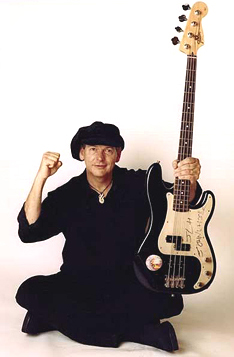 "Me with my black Fender. It was given to me by Fender.
If
you are wondering what the black unreadable writing on it is,
it's John Lee Hooker's autograph. Everyone asks me about
this. Now you know."
CB: Speaking of albums, over the years you've played on numerous recordings, backing up various
artists, and have formed bands such as the Arc Angels and Storyville.
What projects are you currently involved in?
TS: We still do a few Arc
Angels shows now and then or a Storyville show or something like that. Chris (Layton) and I have our own band right now. It's
still kind of shaky, we're not sure who's going to go and who's going to stay. We've been working quite a bit doing that and
I've been doing session work. I just got back from Nashville yesterday. Chris and I did a session with Charlie Daniels. Real
interesting.
CB: How was playing with Charlie different than you past experiences?
TS: He was different, but
he was a lot of fun. He was real nice guy, a super nice guy.
CB: Chris was with you in all the band formations, Storyville, Arc Angels…
TS: We're pretty much a
team.
CB: You mentioned the new band, it's Double Trouble?
TS: Just Double Trouble.
CB: Any plans to record with the new band?
TS: Actually, we already
have. We're doing these Tuesday nights at Antone's and we have special guests come in on the last set. We had several guests,
Joe Ely, Lou Ann Barton, some people you might not have heard of. We had the Flatlanders, we've got enough good live material
and we're trying to put together a record out of that right now. I think it should be real cool.
CB: We look forward to hearing that.
TS: There's going to be some live blues and different kinds of stuff. Joe Ely's stuff is different.
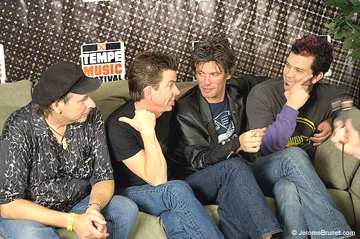 "Arc Angels Reunion Show at the 2006 Tempe Music Festival. We had a blast!"
photo:
Jerome Brunet
CB: Speaking of other projects, you also did a Hot Licks instructional video. What was that
like?
TS: It was absolutely horrible.
It was one of the worst experiences of my life and I still haven't watched that video, it's terrible. Everything went wrong.
We got there at noon and I didn't get to start on my video until one in the morning. My amp blew up. It was just a mess. It
really was.
CB: So, no plans to do another one too soon?
TS: Well actually, I've
had a lot of thoughts about it but I haven't actually started doing anything yet.
CB: You said you only got started on your video at 1:00 am, is that because you were also recording
and playing on the Hot Licks “Playing In A Three Piece Band” and Chris Layton’s' drum video?
TS: Yeah, he got to do his
before me. By the time it got around to doing mine everybody was worn out, tired, and wanted to go home. Then my amp blew
up on me, and I was trying to play those songs and I was getting this (makes buzz sounds) going on.
CB: Well if you ever do it again…
TS: It will be a good one.
If I do it again, I guarantee, it will be a good one.
CB: Tommy, your career has taken you all over the world. Have you ever found yourself in area and
thought, “Wow! I never would have thought I'd ever see anything like this”?
TS: Oh absolutely. I played
all over the world. When I was a kid I started playing when I was 15 years old and I never dreamed it would go that far. Especially
like when we were living in Houston with Johnny (Winter), one night Uncle John and I were sleeping on the floor and everything
we had was in a foot locker. The very next day we living upstate New York in a big mansion, with money, everything we needed.
And that was literally overnight. Things can change so fast.
CB: What are some of your favourite places that music has taken you?
TS: That's hard to answer
because the whole 10 years I played with Stevie, just about every gig was special. Looking back I guess Woodstock, Royal Albert
Hall, Carnegie Hall, Fillmore East, Fillmore West.
CB: What about some of the cities or countries that you thought you never would have seen?
TS: Well, I never thought I'd see Canada. I love Canada. It's one of my favourite places. I
never thought I'd see Switzerland or New Zealand, and I love New Zealand. And any of the places in Europe, because you don't
really know the U.S. until you go there and come back.
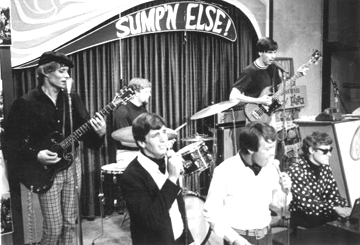 "This was me in a band called The New Breed.
This was in Dallas not long after I got out of high school.
That's me in the back, with short hair, Uncle John on drums.
I actually have two 45's of the band. We were pretty good for back then!"
CB: You mentioned Canada, and our readers will be glad to hear that. Actually, Canada was quick
to embrace Stevie Ray Vaughan and Double Trouble.
TS: Yeah, in fact our first
gold record we got from Canada.
CB: We've got to get you back up here!
TS: I'd be there, I'd love
to come back up there.
CB: Looking through your website shows your serious, socially conscious side, but a very humorous
side as well. Judging from some of the photos of you and Stevie on your site, am I right to presume that there was fun, silly
times?
TS: Oh absolutely, we had
so much fun. Unbelievable, it was like a mixture, a bitter sweet thing. We went through a lot of pain with the drugs and everything,
but at the same time we managed to have a lot of fun. I know that it's kind of hard to reconcile the two, going through pain
and having fun at the same time, but somehow we managed to do that. Yeah, we had a lot of fun. Especially every time we got
on stage, that was fun.
CB: It always looked like you guys were having a blast.
TS: Oh yeah, and we all
had a cool sense of humour when we were just riding in the bus or whatever.
CB: Maybe we can end on that point, any humorous stories to share?
TS: (Laughs). I don't think
I better man! (laughs). There's a lot of them, but all of them are a little risqué, I guess.
CB: Fair enough! Thanks Tommy. Any final comments?
TS: Well, one thing is that
I met Johnny Winter and Stevie in the same club.
CB: Really!
TS: I met Johnny Winter
in this club in Dallas called The Fog, and I started playing with him. Then when we broke up I went back to Dallas that night
and I went into the club and there was this little kid, about 15 years old, all scrawny, pigeon toed, big ears and all that,
and it was Stevie. I met them both in the same place.
CB: Guess there was some magic in that club. Does it still exist?
TS: No, that was back in
68. I think it closed down not too long after that. I want to say that I love everybody in Canada. I wish I was there.
CB: We wish you were, too.
Crossroads Blues would
like to thank Tommy’s wife Kumi for mediating and helping set up this interview, and Tommy for taking the time to speak
with us. You both are great. Check out Tommy’s site here: www.tommyshannon.com
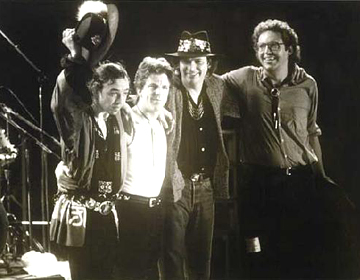 "Stevie, Chris, me, and Reese, taking a bow at the end of the show."
** All photos and corresponding captions from this interview are from
Please do not use them in any way without his consent.
Thank you.
|
